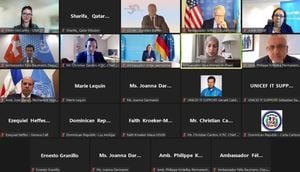Germany's political stage shifted dramatically as voters headed to the polls for the 2025 federal election on February 23. Lasting impact and possible realignment characterized this significant vote where over 59.2 million eligible voters cast ballots for 4,506 candidates, representing 29 parties, vying for 630 seats in the Bundestag.
Leading the contest was Friedrich Merz, the 69-year-old conservative from the Christian Democratic Union/Christian Social Union (CDU/CSU), who was anticipated to snag around 27% of the votes. This election was pivotal for Merz, who not only sought to pave the way for his party but also aimed to consolidate power amid the rising popularity of the far-right Alternative for Germany (AfD), which garnered about 20%. The AfD's candidate, Alice Weidel, had touted provocative messaging, challenging the norm of established conservative values.
Political analysts noted the election’s significance, remarking, "No party is expected to get enough votes to govern alone and outright." The dynamics suggested coalition-building would be necessary, with the CDU likely needing support from one or more parties to form the next government. The increasingly fragmented political environment raised the stakes for smaller parties aiming to meet the 5% threshold required to enter the Bundestag.
The Social Democratic Party (SPD), once the dominant force, saw polling indicating potential devastating results, possibly its worst showing since the Nazi period. Meanwhile, the Greens maintained some support among younger batteries, but even their appeal seemed threatened by rising political discontent.
A surprising upswing came from the leftist party Die Linke, which utilized innovative digital strategies reminiscent of TikTok popularity, gathering renewed support, up from just 3% to 7%. Their resurgence illustrated the volatility and unpredictability of the current political climate.
Polling data identified immigration and the economy as the two pressing issues dominating voter concerns. About 43% of respondents cited economic challenges as their primary focus, with another 42% alarmed by immigration/integration issues, reflecting broader European worries amid shifting demographics and the influence of extreme positions from parties like the AfD.
International factors complicated the election; with the prior coalition government’s collapse led by Chancellor Olaf Scholz, the environment was ripe for change. His administration's lack of stability and rising dissatisfaction prompted many voters to seek alternatives.
The political environment intensified as analysts predicted, "The most important question will then be how many parties are needed to form a government." This dual voting system, refined post-2023 electoral reforms, facilitated the possibility of uncommitted voters impacting the final result heavily.
Following the elections, projections suggested CDU could garner about 211 seats, marking them as the largest party. Nonetheless, records indicated they would still fall short of securing a governing coalition outright, necessitating negotiations with potential partners like the SPD or the Greens. AfD's anticipated 142 seats added another layer of complexity, as Merz emphatically ruled out coalition cooperation with them due to their controversial stances.
This complicated political mosaic revealed the necessity for coalition-building among multiple parties and raised questions about how effectively traditional and new parties could work together. The anticipated standoff between various political ideologies showcased fears of normalization of far-right politics, especially as Alice Weidel's AfD captured attention with direct, often divisive rhetoric.
Challenges to mainstream politics were not limited to the AfD. Figures like Sahra Wagenknecht, formerly of the Die Linke party, launched her own movement, BSW, seeking to recreate leftist appeal, emphasizing the volatile and dynamic nature of the contemporary political discourse.
At this juncture, the coalition negotiations are expected to endure for weeks. Already, early discussions indicated significant challenges as different ideological groups struggle to align on pressing policies, particularly economic and cross-border concerns amid debates over immigration, climate change, and Germany’s role leading Europe.
With the election results beginning to trickle, the political elite find themselves at crossroads, attempting to address public sentiment surrounding economic fears, identity challenges, and community dynamics amid this historic turning point for the nation. Political leaders recognize the intrinsic challenge facing them as they navigate building alliances across a spectrum of ideologies—striving to construct governance capable of addressing both the immediate needs of citizens and the longer-term vision for Germany’s future.



